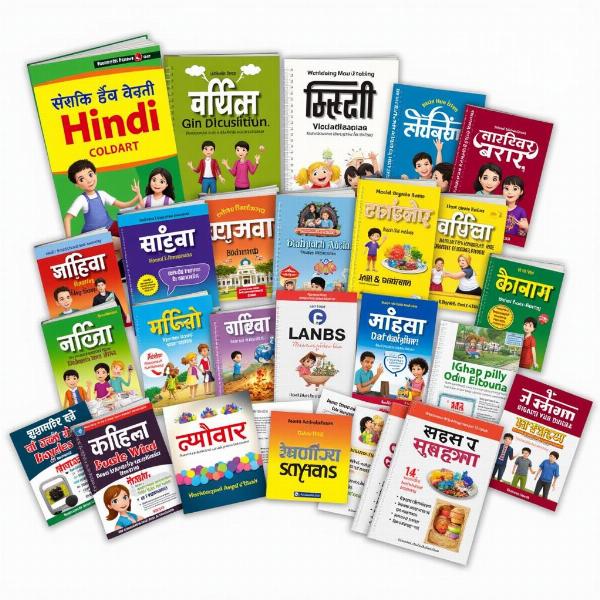Understanding the question “In which class do you read Hindi?” requires delving into its nuances, especially for those unfamiliar with the Indian education system. It doesn’t simply ask about your current academic year, but rather inquires about the level at which you study Hindi as a subject. This question is common in India, where Hindi, one of the official languages, is taught from primary school onwards.
Decoding the Question: “In Which Class Do You Read Hindi?”
This question aims to gauge your proficiency in Hindi. It helps determine your reading comprehension, writing skills, and overall familiarity with the language. The “class” refers to your grade level in school where Hindi is a subject. Answering this question accurately helps in various situations, such as job interviews, educational assessments, and even casual conversations.
Why is this question important?
Knowing someone’s Hindi proficiency is crucial in a multilingual country like India. It helps tailor communication, choose appropriate learning materials, and assess language skills for specific roles or tasks. For instance, a job requiring excellent Hindi writing skills might prefer someone who has studied Hindi until a higher class.
How to answer “In which class do you read Hindi?”
The answer is straightforward. Simply state the highest class or grade level until which you studied Hindi formally as a school subject. For example, “I read Hindi until class 10” or “I read Hindi until class 12.” If you continue to study Hindi at the university level, you can mention that as well. If you didn’t study Hindi formally in school, you can express your proficiency differently, such as “I learned Hindi at home” or “I speak Hindi fluently but didn’t study it in a formal school setting.”
Hindi Education in India
Hindi is taught across different levels in Indian schools, starting from primary school. The curriculum gradually progresses from basic alphabets and grammar to advanced literature and comprehension. This structured learning allows students to develop a strong foundation in the language.
Understanding Hindi Proficiency Levels
While “In which class do you read Hindi?” provides a general idea, assessing true proficiency is more complex. It involves evaluating reading, writing, speaking, and listening skills. Factors like fluency, vocabulary, and grammatical accuracy contribute to a comprehensive understanding of one’s Hindi abilities.
 Hindi Language Learning Materials
Hindi Language Learning Materials
What if I haven’t studied Hindi formally?
Many people learn Hindi outside of formal schooling, whether through family interactions, language courses, or self-study. If this is your case, focus on describing your practical skills and fluency level. You can mention your ability to understand, speak, read, and write Hindi. Providing specific examples of your language use can further clarify your proficiency.
Beyond the Classroom: Practical Applications of Hindi
Knowing Hindi opens doors to numerous opportunities in India. From communicating with a wider population to accessing a rich literary tradition, the benefits are numerous. Professionally, Hindi proficiency is valuable in various fields, especially in government services, media, and education.
Hindi in Everyday Life
Hindi plays a significant role in daily interactions across India. Whether navigating local markets, engaging in community events, or enjoying Bollywood films, understanding Hindi enhances your experience and fosters deeper connections.
Conclusion
“In which class do you read Hindi meaning” essentially seeks to understand your level of Hindi education and proficiency. While answering with the relevant class level is standard practice, focusing on demonstrating your actual language skills provides a more holistic picture. Whether learned in school or elsewhere, Hindi proficiency offers significant advantages in India, impacting both personal and professional spheres.
FAQ
-
What does it mean when someone asks, “In which class do you read Hindi?” This question asks about the highest grade level you completed where Hindi was a formal subject.
-
Is it important to study Hindi in school? While not mandatory everywhere, formal Hindi education provides a structured learning experience and can enhance proficiency.
-
How can I improve my Hindi skills if I didn’t study it in school? Various resources like language courses, online platforms, and immersion experiences can help improve your Hindi.
-
What are the benefits of knowing Hindi? Hindi proficiency enhances communication, cultural understanding, and opens up opportunities in various fields in India.
-
What if I can understand Hindi but not speak it fluently? Be honest about your skills. Explain that you understand but are still developing your speaking fluency.
Meaning-Hindi.in is your one-stop solution for all your Hindi translation needs. We offer a comprehensive range of services, including business and commercial document translation, certified and legal document translation, technical and user manual translation, website and localization services, educational and academic document translation, express translation, and specialized industry translation. Our expert team understands the nuances of Hindi and ensures accurate and culturally sensitive translations. Contact us today for a free quote! Email: [email protected], Phone: +91 11-4502-7584. Meaning-Hindi.in is dedicated to bridging the language gap and facilitating seamless communication across cultures.